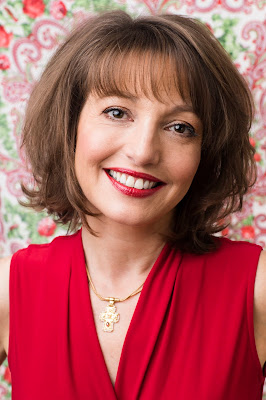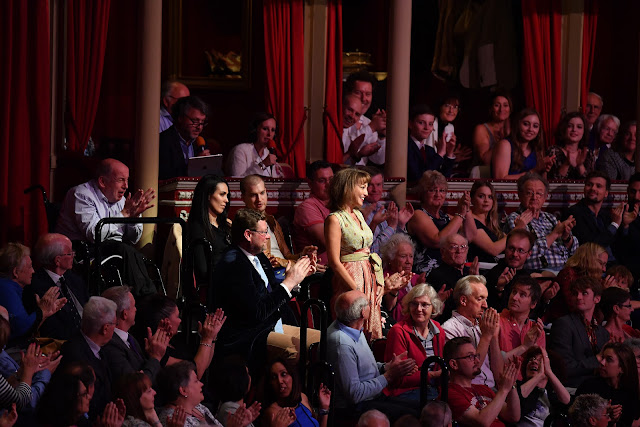 |
| Roxanna Panufnik (Photo Benjamin Ealovega) |
Roxanna's Last Night of the Proms premiere, Songs of Darkness, Dreams of Light highlights her interest in world music of different cultures, countries and faiths. The piece uses two poems, one by Isaac Rosenberg who was English with Lithuanian Ashkenazy Jewish roots, and the other by Kahlil Gibran who was Lebanese-American and a Maronite Christian but also had curiosity for Sufi mysticism, so that the musical elements represent the three Abrahamic faiths [Christianity, Judaism and Islam].
When I ask how the premiere hard gone she at first says that it was epic, but then adds that it was rather surreal and that she could not quite believe it was happening and suffered terrible imposter syndrome. The work was written for the BBC Singers, the BBC Symphony Chorus and the BBC Symphony Orchestra conducted by Sir Andrew Davis. And for Roxanna, one of the best things about the event was the time that she spent working with everyone involved, as she attended rehearsals for each of the groups involved and found everyone delightful and generous, enabling her to try things out and making her feel very welcome. And Andrew Davis gave her fantastic advice on the balance issues, writing for such large forces in the Royal Albert Hall.
 |
| Roxanna Panufnik takes a bow after the premiere of her piece at the Last Night of the Proms (Photo BBC / Chris Christodoulou) |
Roxanna was born in London and daughter of the distinguished Polish composer Andrzej Panufnik, so I wondered where her interest in world music, other faiths and other cultures came from. She explained that at the age of 19 her father gave her a huge book of Polish folk music from the Tatra Mountains, and she fell in love with it. It was a very different sound world, much of the music was in the Lydian mode, which has the fourth note of the scale raised, and Roxanna comments that it sounds as if someone is playing with a raised eyebrow. Also, the combination of a minor third with the raised fourth sounded very Eastern, emphasising that the music came from the fringes of Europe. From this arose her love of World Music, and as various commissions came in, if the words or the atmosphere required something exotic then she explored different World Musics further.
Whilst she was pregnant with her first child, 9/11 happened and she became terrified about what kind of world she was bringing the child into. A friend pointed out to her that Christians, Muslims and Jews all believe in the same God. She had not previously made this connection and wanted to make a point of it. She had a commission for a violin concerto for Daniel Hope, and this became her concerto Abraham, for violin and orchestra, which includes a chant which links the three Abrahamic faiths.
She has found that reaction to such inter-faith and inter-cultural explorations has been positive and that no-one has ever taken offence as far as she knows. In fact, Roxanna has something of a mixed-faith background herself as, though she is a practising Roman Catholic she has some Jewish heritage through her mother. She has also read the Koran from cover to cover, and if alluding to any Islamic musical references she always checks with an Imam and works with Sufi musicians, so that she always works from an informed point of view.
Roxana's Faithful Journey - A Mass for Poland was premiered in Poland on 9 November 2018, in celebration of the centenary of Poland regaining independence, and received its UK premiere on 21 November. The work interleaves settings of Polish poets with the ordinary of the mass. Each of eleven poems describes an historical / atmospheric moment in the decades from 1918 to 2018, with the poems complementing the mood of the mass so that the 'Kyrie' becomes atonement for the horrors of World War One alongside a poem about the origins of the Polish flag (the white of bandages and the red of blood on the battlefield). This interleaving of the mass with other texts is something that Roxanna has done before in her 2011 work, The Dance of Life, [see my review] which was written for Tallinn Philharmonic to celebrate the period when Tallinn was European Capital of Culture, and Roxanna was keen to do something similar again.
Not only was Faithful Journey - A Mass for Poland a celebration of the Polish centenary, but also Roxanna got Polish citizenship last year (her father was Polish) so she is now truly Anglo-Polish.
Roxanna chose the poems but she worked closely with two translators to find the right poems, and she admits that her Polish is terrible, but she is studying and hopes to take her GCSE in the language. The two performances of the work, in Poland and Birmingham, were very different as they used two very different choirs. In Poland, the choir was the National Forum of Music Choir, a professional ensemble of 80 voices, whereas in Birmingham it was the CBSO Chorus, 120 good amateurs. The two made a very different sound, with the Polish choir providing laser focus, and the CBSO Chorus singing with passion and drama, really putting their souls into it. She has set the work simultaneously in Polish and English, so that if the soloist Mary Bevan was singing in Polish, the accompaniment from the choir would use key words from the English translation, and vice versa.
Whilst the piece might at first seem to be rather specific and occasional, Roxanna feels that the last movement looks forward and gives a future use for the piece away from the Centenary.
Being the daughter of a distinguished composer, I wondered whether Roxanna had always had her eyes focused on composition. But she grew up wanting to be an ambulance driver, and even now admits that if composing work dried up then she would still think about ambulance driving! In fact, she became a composer by a process of elimination, as there was nothing else she could do. Though she does not consciously emulate her father's style, she feels that there is a genetic link and points to both of their liking for simultaneous major and minor, though her father used it more sparingly than she does. But there is much that they do differently, he concentrated on orchestra, instrumental and chamber music, writing little for choir, whereas she writes a lot for choirs. Not that she did this on purpose, it was just how it turned out.
Andrzej died when she was 23 after she had left the Royal Academy of Music. But she had put off composing and was working for a TV production company, so he never really heard any of her music as a mature composer.
Looking ahead, Roxanna is writing a new piece for Baltimore, for two conductors, two choirs and orchestra, to be performed by the Baltimore Symphony Orchestra, with conductors Marin Alsop (music director of the Baltimore Symphony Orchestra) and Valentina Peleggi. The text is by Jessica Duchen and looks at the Harriet Tubman, the American escaped slave who went back 13 times to liberate more slaves, and Lakshmibai, an Indian warrior queen and amazing swordsman who fought against the British East India Company. One conductor and choir narrates Harriet's story and the other pair narrate Lakshmibai's, and then the two have a conversation. Roxanna is writing the two in different time signatures, which she admits is 'doing her head in'.
She is really looking forward to the premiere (on 14 March 2019), and has been working closely with Marin Alsop and Valentina Peleggi, along with the director of the choir. Alsop and Peleggi will also be performing the work in Sao Paolo where Alsop is musical director of Sao Paulo Symphony Orchestra (OSESP) with Brazilian choirs,the Coro Academico da OSESP and the Coro da OSESP.
Other pieces in the pipeline include a work for the Rundfunk Choir, Berlin, for the Beethoven centenary in 2020 when the choir will be joined by eight choirs from all over the world, and a piece for the Bach Choir for October 2019, whose working title is 'Four Choral Seasons'.
Roxanna Panufnik's disc Celestial Bird is out on Signum Records
Elsewhere on this blog:
- The Sixteen at Christmas - The Little Child at Cadogan Hall (★★★★) - concert review
- A mash up of Gilbert & Sullivan and the Carry On films: Straus' The Pearls of Cleopatra at the Komische Oper, Berlin (★★★★★) - opera review
- Messiah in Berlin: Handel's oratorio staged in the Philharmonie (★★★★★) - music theatre review
- A triumphal Messiah: Andrew Arthur and the Hanover Band at Kings Place (★★★★★) - concert review
- Towards the Global Jukebox - feature article
- Echoes of Parsifal: songs and piano music by Robin Holloway on Delphian (★★★½) - CD review
- Clarinettist dedications: Roeland Hendrikx in three contrasting concertos for clarinet (★★★½) - CD review
- Carols and more: Our annual Christmas disc round-up - CD review
- Reviving Mozart in Wales & family connections in Milton Keynes: I chat to conductor Damian Iorio - my interview
- Chocolate covered fairy-tale: Hänsel und Gretel at Covent Garden (★★★½) - opera review
- Joyous discovery: Alessandro Scarlatti's Messa per il Santissimo Natale (★★★★) - concert review
- Powerful memorial: composer Andrew Smith on his Requiem dedicated to the victims of the 2011 Utøya massacre in Norway - interview
- Christmas in Leipzig: Solomon's Knot in Bach, Schelle & Kuhnau (★★★★) - concert review
- Winter Fragments: Chamber music by Michael Berkeley (★★★½) - CD review
- Home

.jpg)









No comments:
Post a Comment